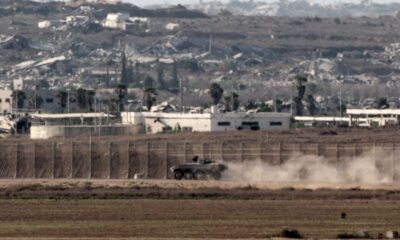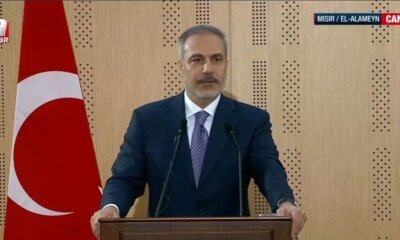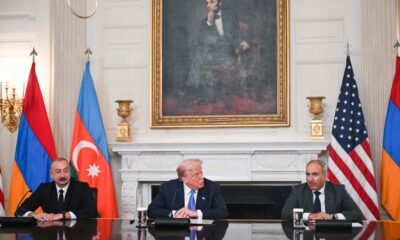Politics
Turkish FM Fidan to visit Egypt to discuss Israel’s Gaza plan
Foreign Minister Hakan Fidan is set to travel to Egypt on Saturday for a series of talks with senior officials on Israel’s plans to take control of Gaza City and the humanitarian situation there, a Foreign Ministry source said on Friday.
Israel’s political-security Cabinet approved a plan early on Friday to take control of Gaza City, as it expands its military operations despite growing domestic and international criticism over the devastating, almost two-year-old war.
NATO member Türkiye, which has said Israel’s assault on Gaza amounts to a genocide and halted all trade with it, condemned the plan of Prime Minister Benjamin Netanyahu’s “fundamentalist government,” and urged world powers and the United Nations Security Council to act to prevent its implementation.
During his visit to Cairo, Fidan will meet Egyptian President Abdel-Fattah el-Sissi and other officials to discuss bilateral ties and regional issues, including the Gaza cease-fire negotiations, mediated by Egypt, Qatar and the United States, as well as Israel’s takeover plan, the source said.
Fidan will “evaluate joint efforts to end the genocide in Gaza and allow the unhindered access of humanitarian aid into Gaza, emphasize that the occupying Israel’s actions targeting a two-state solution and its latest steps toward the annexation of Gaza are the biggest obstacle to regional peace and stability,” the source said.
Ankara has praised Egypt, Qatar and the U.S. for their mediation efforts between Israel and the Palestinian group Hamas, whose attack in 2023 prompted Israel’s genocidal war on Gaza, killing over 60,000 people, mostly women and children. It has rejected any Gaza takeover plans or attempts to displace Palestinians.
Fidan will also discuss developments in Africa, including in Libya, Sudan and Somalia, the person added.
Politics
Türkiye becoming sought-after mediator at global peace tables: Erdoğan
President Recep Tayyip Erdoğan on Friday said Türkiye has emerged as a trusted and sought-after actor in international peace efforts, advancing with confidence on both diplomatic and economic fronts while maintaining a principled foreign policy that protects the oppressed and avoids reckless adventurism.
Speaking at the Foreign Economic Relations Board’s (DEIK) 38th Ordinary Financial General Assembly and Masters of Respect Award Ceremony in Istanbul, Erdoğan praised Türkiye’s growing diplomatic weight, citing mediation efforts in the Russia-Ukraine war, its principled stance during the Gaza crisis, and its role in Libya, Karabakh, the Gulf, and beyond.
“Türkiye is becoming a sought-after actor at peace tables,” Erdoğan said. “Today, Türkiye trusts and believes in itself and is advancing toward its goals with confidence and firm steps. We neither remain silent in the face of oppression nor chase adventure. Every step is calculated and driven by conscience, justice, and the dignity of human life.”
Erdoğan stressed that Ankara’s approach is rooted in protecting the interests of all 86 million citizens while standing with oppressed peoples worldwide. He said Türkiye has consistently pursued “balanced, principled, and resolute” policies shaped from an Ankara-centered perspective — not by seeking approval from foreign powers.
He recalled Türkiye’s mediation between Russia and Ukraine from the first day of the war, its response to Israel’s assaults in Gaza, Lebanon, Yemen, and Iran, and its decision to halt trade with Israel in protest of what he called the “Gaza genocide.” He also pointed to the strengthening of ties with Gulf states and Türkiye’s presence “wherever needed” — from Libya to Karabakh.
“Even our rivals now speak with praise about Türkiye’s balanced and principled stance,” he said.
Economic strength bolstering diplomacy
Erdoğan also highlighted Türkiye’s economic achievements, saying record exports and a historic milestone in national income support its global influence.
In July 2025, Türkiye posted the highest monthly goods export figure in its history at $25 billion, with foreign trade deficits at their lowest in nine months. Annual exports in 2002 stood at $36 billion; today, monthly exports alone approach that level.
Per capita income rose to $15,971 in the first quarter of 2025, while national income surpassed $1 trillion for the first time, reaching $1.37 trillion. “This shows Türkiye has moved into a different league,” Erdoğan said.
He also underlined the transformation in export composition, with medium- and high-tech goods exceeding $101 billion in value, making up 41% of total exports. The defense sector reached $7.15 billion in exports to 180 countries, while the automotive industry ranked fourth in Europe and 12th globally.
Erdoğan credited DEIK for driving Türkiye’s global trade diplomacy, saying it now serves as both a representative of the private sector and a diplomatic voice for Turkish business abroad.
Domestic unity as part of peace vision
Turning to domestic politics, Erdoğan praised the establishment of the Turkish Parliament’s “National Solidarity, Brotherhood and Democracy Commission,” describing it as a breakthrough in Türkiye’s fight against terrorism and a symbol of political unity.
“This is a historic process that can change who wins and loses,” he said, noting that the committee’s first meeting carried a constructive atmosphere, which he hopes will grow stronger.
He said Türkiye’s half-century struggle with terrorism has cost the economy an estimated $2 trillion and claimed countless young lives, destroying families and hindering democracy. “Now, we want the country and the nation to stop losing,” he said.
“Our envelope is unity, our message is brotherhood,” Erdoğan declared. “This letter, signed by all 86 million citizens, will reach its address sooner or later. In the end, we will present not only a strong economy but also a strong democracy and brotherhood.”
Erdoğan concluded by affirming that Türkiye will continue to expand its diplomatic role, strengthen economic power, and protect its national interests while advancing peace at home and abroad.
Politics
Syria slams terrorist group YPG’s conference, exits Paris talks
Syria on Saturday slammed a recent conference organized by the YPG terrorist group as a “serious blow” to ongoing negotiations and a “clear violation” of a March 10 agreement.
A senior government source cited by the Syrian Arab News Agency SANA said the event held in northeastern Syria was “not a unifying national framework” but rather a “fragile coalition” of parties seeking to undermine Syria’s unity and sovereignty.
Damascus accused the participants of “harboring separatist agendas, relying on foreign backing, and evading commitments under the peace process,” according to SANA.
The government condemned the hosting of “separatist figures involved in hostile acts,” saying this amounted to “an attempt to internationalize the Syrian issue, invite foreign intervention, and reimpose sanctions.”
It warned that proposals aired at the meeting, including calls for a new “national army nucleus,” revisions to the constitutional declaration, and changes to administrative divisions, directly contradicted provisions of the March 10 deal, which mandated the integration of all civil and military institutions in northeastern Syria into state structures.
Damascus also accused “extremist Kurdish factions” within the SDF of pursuing “systematic demographic change against Arab Syrians” under instructions from Iraq’s Qandil Mountains, where the PKK terror group operated from.
The YPG is a dominant group in the Syrian Democratic Forces (SDF) and an offshoot of the PKK terrorist group.
The government stressed that the shape of the Syrian state must be determined “through a permanent constitution approved by popular referendum,” not “through factional understandings or armed coercion.”
As a result of the conference, the source confirmed that Syria will not participate in any planned meetings in Paris and will refuse to negotiate with “any party seeking to revive the era of the defunct regime under any name or cover.”
Damascus urged the SDF to “seriously engage” in implementing the March 10 agreement and called on international mediators to “relocate all talks to the Syrian capital,” describing Damascus as “the legitimate and national address for dialogue among Syrians.”
On March 10, the Syrian presidency announced the signing of an agreement for the integration of SDF into state institutions, reaffirming the country’s territorial unity and rejecting any attempts at division.
Bashar Assad, Syria’s leader for nearly 25 years, fled to Russia in December, ending the Baath Party regime, which had been in power since 1963.
A new transitional administration led by Ahmed Al-Sharaa was formed in January.
Politics
Türkiye welcomes peace progress between Azerbaijan, Armenia
Türkiye on Friday welcomed progress toward establishing lasting peace between Azerbaijan and Armenia, following a declaration recorded in Washington on Aug. 8.
In a statement, the Foreign Ministry said the step comes at a time of intensifying global conflicts and crises, describing it as a highly significant development for ensuring regional peace and stability.
Ankara expressed appreciation for the contribution of the U.S. administration to the process and said a “historic opportunity” has emerged for achieving peace and prosperity in the South Caucasus.
“As Türkiye, we will continue to contribute to efforts aimed at seizing this opportunity and will support the devoted efforts of our dear Azerbaijan,” the ministry said.
U.S. President Donald Trump on Friday announced that Armenia and Azerbaijan had agreed to permanent peace, unveiling the deal at a White House summit with the leaders of the two South Caucasus nations long locked in conflict.
The deal grants the U.S. exclusive development rights to a strategic South Caucasus transit corridor, dubbed the “Trump Route for International Peace and Prosperity.” U.S. officials said it was finalized after multiple visits to the region and will serve as a foundation for full normalization between the two nations.
Politics
Trump to host Azerbaijan, Armenia to sign US-brokered peace deal
U.S. President Donald Trump is set to host Azerbaijani President Ilham Aliyev and Armenian Prime Minister Nikol Pashinyan at the White House on Friday for the signing of a U.S.-brokered peace agreement aimed at formally ending decades of conflict between the two South Caucasus neighbors.
Trump said Pashinyan and Aliyev would also be signing agreements with the U.S. to “pursue Economic opportunities together, so we can fully unlock the potential of the South Caucasus Region.”
“Many Leaders have tried to end the War, with no success, until now, thanks to ‘TRUMP,'” Trump wrote Thursday night on his Truth Social site.
The prospective agreement could potentially put an end to decades of conflict and set the stage for a reopening of key transportation corridors across the South Caucasus that have been shut since the early 1990s.
Three U.S. officials, who were not authorized to speak publicly ahead of the announcement and spoke on condition of anonymity, said the agreements included a major breakthrough establishing a key transit corridor across the region, which had been a hang-up in peace talks.
The agreement, according to the officials, would give the U.S. leasing rights to develop what is known as the Zangezur Corridor and rename it the “Trump Route for International Peace and Prosperity.”
It would link Azerbaijan to its Nakhchivan region, which is separated from the rest of the country by a 32-kilometer (20-mile) patch of Armenia’s territory.
The transit corridor is expected to eventually include a rail line, oil and gas lines, and fiber optic lines, allowing for the movement of goods and eventually people. The deal does not call for the U.S. to pay for the construction of the transit corridor, but instead for private corporations to develop it.
The deal was reached after a visit earlier this year by Trump’s special envoy Steve Witkoff to Azerbaijan’s capital of Baku and continued talks between the parties.
Karabakh dispute
Armenia and Azerbaijan faced off for nearly four decades of fighting for control of the Karabakh region, which was known internationally as Nagorno-Karabakh.
During the Soviet era, the mostly Armenian-populated region had an autonomous status within Azerbaijan. Long-simmering tensions between Christian Armenians and mostly Muslim Azerbaijanis boiled over as the Soviet Union frayed in its final years.
Clashes erupted in 1988 when the region made a bid to join Armenia. As the USSR collapsed in 1991 and Armenia proclaimed independence, hostilities escalated into a full-blown war that killed an estimated 30,000 people and displaced about 1 million.
When the war ended with a cease-fire in 1994, Armenian separatist forces backed by the government in Yerevan not only took control of the region but also captured broad swaths of Azerbaijan.
Decades of international mediation efforts failed. In September 2020, Azerbaijan launched an operation to reclaim the region. NATO-member Türkiye, which has close ethnic, cultural and historic bonds with Azerbaijan, gave it strong support.
In six weeks of fighting involving heavy artillery, rockets and drones that killed more than 6,700 people, Azerbaijani troops drove Armenian separatists from areas they controlled outside Karabakh. They also reclaimed broad chunks of Karabakh. A Russia-brokered peace deal saw the deployment of about 2,000 troops to the region as peacekeepers.
Azerbaijan then reclaimed all of Karabakh in September 2023 in a lightning military campaign. Over 100,000 people returned to Armenia in a week.
Russia, busy with its war in Ukraine, didn’t intervene, angering Armenia’s leadership, which responded by scaling down its ties with Moscow and bolstering relations with the West.
After reclaiming Karabakh, Azerbaijan engaged in talks with Armenia on normalizing ties. As part of the negotiations, Armenia agreed to hand over several border villages to Azerbaijan.
Azerbaijan also has demanded that Armenia rewrite its constitution, which contains a reference to the prospective reunification of Armenia and the Karabakh region. The authorities have yet to present a revised draft in the face of public protests.
A key stumbling block in peace talks was Azerbaijan seeking a land bridge to its Nakhchivan region. Azerbaijan doesn’t trust Armenia to control the Zangezur corridor, while Armenia has staunchly resisted control by a third party, seeing it as a breach of its sovereignty.
It was not clear how that resistance had been overcome in the deal.
Russian influence
Russia, which has a military base in Armenia, had previously proposed deploying its troops to secure the corridor. Armenia, bent on scaling down ties with Russia in favor of closer relations with the West, rejected the idea.
“Russia has been left on the sidelines, because the Kremlin has nothing to offer to Armenia and Azerbaijan,” said Olesya Vartanyan, a South Caucasus expert, noting that Moscow’s regional influence withered after it focused on the war in Ukraine.
“Russia now lacks resources to deal with Armenia and Azerbaijan,” Vartanyan said.
Türkiye’s stance
The prospective peace deal would also pave the way for Türkiye and Azerbaijan to reopen borders with Armenia that have been shut for nearly four decades, leaving the landlocked country to rely on limited transit routes via Georgia and Iran.
Türkiye views the prospective agreement as part of its efforts to expand its influence in the South Caucasus, while Armenia sees the reopening of the border and resuming trade with Türkiye as a top priority. Pashinyan, who visited Türkiye in June in the first such visit by an Armenian leader, has made normalizing ties with Türkiye a key goal.
“For Armenia, it would guarantee stability and allow access to the Turkish market, ports and investments, as well as its inclusion into key regional transport corridors,” Vartanyan said, adding that a peace deal would help make Armenia a key link between Europe and Asia.
“Armenia has had an extensive transport infrastructure since the Soviet times, including railways and highways that could significantly expand trade routes via South Caucasus,” she said.
Politics
Türkiye urges int’l pressure to stop Israel’s Gaza plan
Türkiye on Friday called on the international community to prevent Israel’s plans to “take control” of Gaza City under a plan proposed by Prime Minister Benjamin Netanyahu.
“Every step taken by the fundamentalist Netanyahu government to continue its genocide and expand its occupation deals a heavy blow to global peace and security,” the Turkish Foreign Ministry said in a statement.
Calling Israel’s move an attempt to render Gaza uninhabitable and forcibly displace Palestinians from their land, the ministry said Türkiye “strongly condemns” Israel’s decision.
It stressed that lasting peace in the region can only be achieved through respect for international law, prioritization of diplomacy, and protection of fundamental human rights.
Under the plan to “defeat” Hamas in the Gaza Strip, the Israeli army “will prepare to take control of Gaza City,” Netanyahu’s office said Friday.
“Israel must immediately halt its war plans, agree to a cease-fire and begin negotiations for a two-state solution,” the Turkish statement said.
It called on the international community to “carry out its responsibility to prevent this plan’s implementation” and urged the U.N. Security Council to take binding decisions against Israel.
Foreign Minister Hakan Fidan was set to travel to Egypt on Saturday for a series of talks with senior officials on Israel’s plans. Fidan will “evaluate joint efforts to end the genocide in Gaza and allow the unhindered access of humanitarian aid into Gaza, emphasize that the occupying Israel’s actions targeting a two-state solution and its latest steps toward the annexation of Gaza are the biggest obstacle to regional peace and stability,” his office said Friday.
Before the decision, Netanyahu said Israel planned to take full control of Gaza but did not intend to govern it.
He told U.S. network Fox News on Thursday that the military would seize complete control of the Gaza Strip, noting that Israel did not want “to keep” the territory, which it occupied in 1967 but withdrew troops and settlers from in 2005.
Netanyahu said Israel wanted a “security perimeter” and to hand the Palestinian territory to “Arab forces that will govern it properly without threatening us.”
“That’s not possible with Hamas,” he added.
His office on Friday said a majority of the security cabinet had adopted “five principles,” including demilitarization of the territory and “the establishment of an alternative civil administration that is neither Hamas nor the Palestinian Authority.”
An unspecified “alternative plan” was rejected by the cabinet, it added.
The Israeli army said last month that it controlled 75% of the Gaza Strip, mainly from its positions in the territory along the border.
An expanded Israeli offensive in Gaza could see ground troops operate in densely populated areas where hostages are believed to be held, Israeli media have reported.
‘War of extermination’
Nations around the world expressed concern over Israeli plans to wrest control of Gaza City, saying that it would only worsen the conflict and lead to more bloodshed. U.N. human rights chief Volker Turk said the plan must be “immediately halted.” He said that Israel should instead allow “the full, unfettered flow of humanitarian aid” and Palestinian armed groups must unconditionally release hostages.
U.K. Prime Minister Keir Starmer said the plan was “wrong” and added that “this action will do nothing to bring an end to this conflict or to help secure the release of the hostages,” but would “only bring more bloodshed.”
“Gaza belongs to the Palestinian people and is an inseparable part of Palestinian territory,” a Chinese Foreign Ministry spokesperson told Agence France-Presse (AFP) in a message. “The correct way to ease the humanitarian crisis in Gaza and to secure the release of hostages is an immediate cease-fire,” they added.
Germany will halt the export of military equipment to Israel, which could be used in the Gaza Strip, Chancellor Friedrich Merz said.
Merz said it was “increasingly difficult to understand” how the Israeli military plan would help achieve legitimate aims and added: “Under these circumstances, the German government will not authorize any exports of military equipment that could be used in the Gaza Strip until further notice.”
Spanish Foreign Minister Jose Manuel Albares said: “We firmly condemn the decision of the Israeli government to escalate the military occupation of Gaza. It will only cause more destruction and suffering.”
He added that “a permanent cease-fire, the immediate and massive entry of humanitarian aid, and the release of all hostages are urgently needed.”
The Palestinian Foreign Ministry condemned Israel’s decision to occupy the Gaza Strip, saying it revealed the true nature of its war, “an unjustified campaign against Palestinian civilians.”
“This decision reveals that the Israeli war was never defensive; it has always been a war of extermination and forced displacement against the people of Gaza,” the ministry said, warning of the “certain death” of civilians remaining in the strip.
Israel has been facing mounting outrage over its destructive war on Gaza, where more than 61,200 people have been killed, mostly women and children, since October 2023. The military campaign has devastated the enclave, which is facing famine.
Last November, the International Criminal Court (ICC) issued arrest warrants for Netanyahu and his former Defense Minister Yoav Gallant for war crimes and crimes against humanity in Gaza.
Israel also faces a genocide case at the International Court of Justice (ICJ) for its war on the enclave.
Politics
Armenia, Azerbaijan agree to groundbreaking peace agreement
U.S. President Donald Trump on Friday announced that Armenia and Azerbaijan had agreed to permanent peace, unveiling the deal at a White House summit with the leaders of the two South Caucasus nations long locked in conflict.
“Armenia and Azerbaijan are committing to stop all fighting forever, open up commerce, travel and diplomatic relations, and respect each other’s sovereignty and territorial integrity,” Trump said.
He also said the U.S. would lift restrictions on military cooperation with Azerbaijan.
Trump met separately with Azerbaijani President Ilham Aliyev and Armenian Prime Minister Nikol Pashinyan at the White House, beginning at 2:30 p.m. (1830 GMT), with a trilateral meeting set for 4:15 p.m. (2015 GMT), the White House said.
The agreement includes exclusive U.S. development rights to a strategic transit corridor through the South Caucasus, dubbed the “Trump Route for International Peace and Prosperity.” U.S. officials said the agreement was hammered out during repeated visits to the region and would provide a basis for working toward a full normalization between the countries.
“We anticipate significant infrastructure development by American companies. They’re very anxious to go into these two countries, and they’re going to spend a lot of money, a lot of money, which will economically benefit all three of our nations,” he said. “This is incredibly positive news for the future of the entire region.”
Trump said that as part of the agreement, the US would be lifting restrictions on US defense cooperation with Azerbaijan.
For his part, Aliyev hailed the “historic day” being marked by the signing.
“We are today establishing peace in the Caucasus, which will open great opportunities, not only for our region,” he said. “I’m sure that Armenia and Azerbaijan will find courage and responsibility to reconcile, and also the people will reconcile. We will turn the page of standoff confrontation, and bloodshed, and provide bright and safe future for our children.”
Pashinyan said the leaders were ushering in a “new era based on the full respect for the sovereignty and territorial in the integrity of each other.”
“Today’s declarations which President Trump personally will sign as witness gives confidence and assurance that we’re opening a chapter of peace, prosperity, security and economic cooperation in the South Caucasus,” he said.
In a statement, US Secretary of State Marco Rubio also welcomed the “historic peace deal.”
“President Trump brought these parties together and brokered a deal that ends decades of conflict,” he said.
“This is an opportunity for both countries to move forward and focus on unlocking the economic potential of the South Caucasus region, which will bring trade deals and prosperity for the American people and both Armenia and Azerbaijan,” he added.
The White House earlier described the TRIPP as a “multimodal transit area” linking Azerbaijan and the Nakhchivan Autonomous Republic to the west via Armenian territory.
Previous proposals to resolve the conflict included a route between Nakhchivan and mainland Azerbaijan known as the Zangezur Corridor.
Negotiations over who will operate the route are expected to begin in the middle of next week, and a senior administration official said that so far, nine potential operators have expressed interest, including three American firms.
Working groups are expected to be launched immediately after the deal is inked to iron out the details of the “roadmap” over the course of the coming months.
The leaders also signed a joint letter requesting the Organization for Security and Cooperation in Europe dissolve the Minsk Group, a mediation organization co-chaired by the US, Russia, and France to resolve the conflict between the nations.
Azerbaijan’s crushing victory in a six-week war with Armenia saw Baku recapture swathes of its lands, which Armenian forces had controlled for three decades. In September, Azerbaijan launched a lightning offensive to drive away remnants of the separatists. The one-day offensive concluded with another victory for Azerbaijan and separatist leaders either turned themselves in or were captured by Azerbaijani forces days later. Azerbaijan and Armenia pursue peace talks through international mediation but talks have so far failed to produce a breakthrough.
U.S. officials highlighted the opportunities presented for both countries and U.S. investors through the creation of the new transit corridor, which will allow greater exports of energy and other resources.
“What’s going to happen here with the Trump route is, this isn’t charity. This is a highly investable entity,” said one senior administration official, adding that at least nine companies had in recent days expressed interest in operating the transit corridor, including three U.S. firms.
Under a carefully negotiated section of the documents the leaders will sign on Friday, Armenia plans to award the U.S. exclusive special development rights for an extended period on a transit corridor that will be named the Trump Route for International Peace and Prosperity, and known by the acronym TRIPP, the officials told Reuters this week.
Trump would sign a directive to set up a negotiating team to work out details for how to operate the corridor, with initial commercial negotiations to begin next week, one of the officials said.
“The losers here are China, Russia and Iran. The winners here are the West,” one of the officials said. “Both countries that have been in conflict for 35 years… are looking and talking about full peace with each other tomorrow.”
“It’s being done, not through force, but through commercial partnership… with these two countries,” the official said. “The joint declaration that we’re going to see signed today is the first-ever peace declaration signed bilaterally by the two countries since the end of the Cold War.”
Trump has tried to present himself as a global peacemaker in the first months of his second term. The White House credits him with brokering a cease-fire between Cambodia and Thailand and sealing peace deals between Rwanda and the Democratic Republic of Congo and Pakistan and India. He is also intensifying efforts to end Russia’s war in Ukraine, eyeing a possible meeting with Russian President Vladimir Putin as early as next week. Senior administration officials told reporters the agreement between Armenia and Azerbaijan marked the first end to several frozen conflicts on Russia’s periphery since the end of the Cold War and said it would send a powerful signal to the entire region.
“This isn’t just about Armenia. It’s not just about Azerbaijan. It’s about the entire region, and they know that that region is going to be safer and more prosperous with President Trump,” a senior administration official said. A peace deal could transform the South Caucasus, an energy-producing region neighboring Russia, Europe, Türkiye and Iran that is criss-crossed by oil and gas pipelines but riven by closed borders and longstanding ethnic conflicts.
-

 Politics2 days ago
Politics2 days agoTürkiye urges int’l pressure to stop Israel’s Gaza plan
-

 Daily Agenda1 day ago
Daily Agenda1 day agoForeign Minister Fidan: Israel persistently sabotes cease -fire initiatives
-

 Sports3 days ago
Sports3 days agoSofia crisis: Türkiye-Russia standoff over heptathlete Yakushina
-

 Daily Agenda20 hours ago
Daily Agenda20 hours agoLawyer Mehmet Yıldırım and CHP Provincial Chairman Özgür Çelik Came Out
-

 Economy2 days ago
Economy2 days agoTürkiye on verge of ending FX-protected deposit scheme
-

 Economy2 days ago
Economy2 days agoTürkiye’s export outlook remains robust despite global uncertainty
-

 Politics2 days ago
Politics2 days agoArmenia, Azerbaijan agree to groundbreaking peace agreement
-

 Daily Agenda1 day ago
Daily Agenda1 day agoMillion Touristic Facility was left to decay




